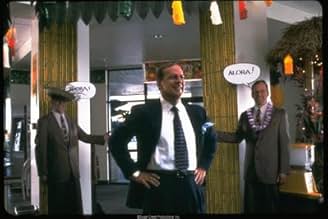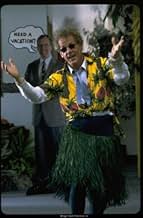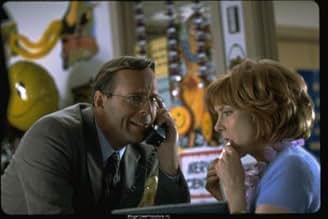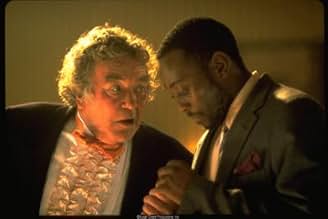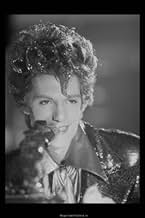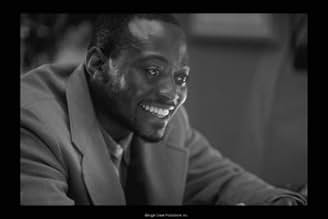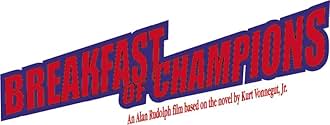Breakfast of Champions
- 1999
- Tous publics
- 1h 50min
NOTE IMDb
4,6/10
8,6 k
MA NOTE
Ajouter une intrigue dans votre langueA rich car dealer is losing his mind. His son lives in the bomb shelter. His suicidal wife has an affair with his transvestite sales manager.A rich car dealer is losing his mind. His son lives in the bomb shelter. His suicidal wife has an affair with his transvestite sales manager.A rich car dealer is losing his mind. His son lives in the bomb shelter. His suicidal wife has an affair with his transvestite sales manager.
- Réalisation
- Scénario
- Casting principal
- Récompenses
- 1 nomination au total
Ken Hudson Campbell
- Eliot Rosewater
- (as Ken Campbell)
- …
Avis à la une
After a recent Vonnegut reading binge I was eager to see Breakfast of Champions when I saw it on the video shelf. A great cast, a director (Aland Rudolph) who has made several films I've enjoyed (Choose Me, The Moderns, Trouble in Mind). Sadly, BofC is quite a disappointment.
Two things really stick out for me. Although Bruce Willis was quite good as Dwayne Hoover, too many of the other characters, notably Harry LeSabre (Nick Nolte) and Wayne Hoobler (Omar Epps) are portrayed in frenetic over the top performances. OK...we get it that there are all sorts of crazies running amuck in Midland City, but the point Vonnegut was making in his novel was that this madness is displayed in the "normal" everyday way that we live our lives in America. The values (consumerism, greed, violence) and actions that are considered normal in the United States are themselves proof that we are all suffering from a form of madness...showing these fine actors jumping around and uttering indecipherable gibberish shows only that they are annoying.
The film also has a problem in creating a consistent point of view. In the novel the author guides us through Dwayne Hoovers' unfolding madness and is actually a character in the book. The movie can't give us the background information the books' narrator did and I would guess that anyone who hasn't read the book will find the movie tough going...perhaps downright incomprehensible.
Lastly, as a great fan of Kilgore Trout (Vonnegut fans know him as a character who pops up in several Vonnegut novels) I thought Albert Finney did quite a nice job; he had just the right air of unkempt, curmudgeonly, insane genius that makes Trout my favorite Vonnegut character of all time. Still, it's hardly enough to save this mess...I admire the effort in bringing Breakfast of Champions to the screen, but in the end it's likely that this is an unfilmable novel.
Two things really stick out for me. Although Bruce Willis was quite good as Dwayne Hoover, too many of the other characters, notably Harry LeSabre (Nick Nolte) and Wayne Hoobler (Omar Epps) are portrayed in frenetic over the top performances. OK...we get it that there are all sorts of crazies running amuck in Midland City, but the point Vonnegut was making in his novel was that this madness is displayed in the "normal" everyday way that we live our lives in America. The values (consumerism, greed, violence) and actions that are considered normal in the United States are themselves proof that we are all suffering from a form of madness...showing these fine actors jumping around and uttering indecipherable gibberish shows only that they are annoying.
The film also has a problem in creating a consistent point of view. In the novel the author guides us through Dwayne Hoovers' unfolding madness and is actually a character in the book. The movie can't give us the background information the books' narrator did and I would guess that anyone who hasn't read the book will find the movie tough going...perhaps downright incomprehensible.
Lastly, as a great fan of Kilgore Trout (Vonnegut fans know him as a character who pops up in several Vonnegut novels) I thought Albert Finney did quite a nice job; he had just the right air of unkempt, curmudgeonly, insane genius that makes Trout my favorite Vonnegut character of all time. Still, it's hardly enough to save this mess...I admire the effort in bringing Breakfast of Champions to the screen, but in the end it's likely that this is an unfilmable novel.
I can't believe how a perfect adaptation of one of Vonnegut's most personal works could be ignored with such intensity in this country.
Four actors from Armageddon, Bruce Willis included of course, have seen their way into the most underrated movie of the year. Do you think that was an accident? Of course not. It is from the success of movie blockbusters like Armageddon that movies like Breakfast of Champions are able to be made. And that's exactly what the movie is about.
Vonnegut's classic is among the few greatest satires of American Life I have ever known. I was a profound fan of the book, so I had high expectations for the film. Not only did the film match the qualitative relevance of the novel, I felt the movie surpassed its original intentions, fleshing out the characters and rounding out the story with a humanism often missing from Vonnegut's works.
What is success? Is it something you feel, or is it something perceived by others? What is a good movie? Can a good movie stand on its own, or does it have to be financially and critically acclaimed in our time?
Like many martyrs in history, the success of Breakfast of Champions is that it was made, and that it reaches the audience it wants to, however small.
I watch this film, and know in my heart that there is love behind every scene, and that even though it seems that the work goes on its own artistic tangents, the underlying unity of the film is sound and loyal. Everything in the film is for a reason.
Four actors from Armageddon, Bruce Willis included of course, have seen their way into the most underrated movie of the year. Do you think that was an accident? Of course not. It is from the success of movie blockbusters like Armageddon that movies like Breakfast of Champions are able to be made. And that's exactly what the movie is about.
Vonnegut's classic is among the few greatest satires of American Life I have ever known. I was a profound fan of the book, so I had high expectations for the film. Not only did the film match the qualitative relevance of the novel, I felt the movie surpassed its original intentions, fleshing out the characters and rounding out the story with a humanism often missing from Vonnegut's works.
What is success? Is it something you feel, or is it something perceived by others? What is a good movie? Can a good movie stand on its own, or does it have to be financially and critically acclaimed in our time?
Like many martyrs in history, the success of Breakfast of Champions is that it was made, and that it reaches the audience it wants to, however small.
I watch this film, and know in my heart that there is love behind every scene, and that even though it seems that the work goes on its own artistic tangents, the underlying unity of the film is sound and loyal. Everything in the film is for a reason.
Midland City is a perfectly ordinary American city. Within the confines of this small world, dealership owner Dwayne Hoover is a celebrity despite the fact that his wealth and success has only served to make him more and more unstable and unhappy. His wife is suicidal and his secretary offers limited relief in their affair. Not that many others have it better. Harry Le Sabre is his sales manager and is full of guilt over his cross dressing and active sex life. With this community breaking down, small time porno-mag article contributor Kilgore Trout makes his way to the city to take his place as the guest of honour at the arts fest not quite sure how anyone has heard of him.
Another commentator on this site has said that if you showed this film to ten people then probably eight would hate it; those praising it have claimed it to be a wonderful version of Vonnegut's novel. Not having read this, I can believe that he (and this) is an acquired taste because I found it to be an almost unbearably messy affair that was delivered in a silly manner that offered little of interest. Indeed for much of the film I wasn't sure what to make of it. Perhaps it tried to do too much but there seemed to be so many characters rammed in here that most of them just seemed out of place and with no development whatsoever. Of course it didn't help that I didn't see much about those given plenty of time either. Dwayne himself is the perfect example of this; his madness seems to have a reason but the film does a terrible job in bringing this out.
Rudolph seems passionate in his direction but it seems he is too close to the material and his direction might assume a familiarisation with the material that the mass audience will not have. The delivery is too silly and knowingly manic it takes away from the material and it left me feeling like perhaps it was my fault for not having read the story before watching it. It annoyed me as well that such a starry cast were mostly wasted presumably they saw something in the material that did not make it to the screen. Willis tries hard but is not supported at all. Finney spends most of the time in his own film, not really fitting into the narrative. Nolte is amusing; Hershey is wasted; Epps has been told something by the director that the rest of us aren't let into. Patton, Wilson, Haas, Lewis and others provide thankless supports.
This may well be perfect for fans of Vonnegut, I cannot say but suffice to say that I am not one of them. However for the casual viewer this is messy, disjointed and pointless to the point of being painful. I gave it two hours as I tried to work it out, hoping that it would make something out of itself but in the end I was left out of pocket with nothing to show for my investment.
Another commentator on this site has said that if you showed this film to ten people then probably eight would hate it; those praising it have claimed it to be a wonderful version of Vonnegut's novel. Not having read this, I can believe that he (and this) is an acquired taste because I found it to be an almost unbearably messy affair that was delivered in a silly manner that offered little of interest. Indeed for much of the film I wasn't sure what to make of it. Perhaps it tried to do too much but there seemed to be so many characters rammed in here that most of them just seemed out of place and with no development whatsoever. Of course it didn't help that I didn't see much about those given plenty of time either. Dwayne himself is the perfect example of this; his madness seems to have a reason but the film does a terrible job in bringing this out.
Rudolph seems passionate in his direction but it seems he is too close to the material and his direction might assume a familiarisation with the material that the mass audience will not have. The delivery is too silly and knowingly manic it takes away from the material and it left me feeling like perhaps it was my fault for not having read the story before watching it. It annoyed me as well that such a starry cast were mostly wasted presumably they saw something in the material that did not make it to the screen. Willis tries hard but is not supported at all. Finney spends most of the time in his own film, not really fitting into the narrative. Nolte is amusing; Hershey is wasted; Epps has been told something by the director that the rest of us aren't let into. Patton, Wilson, Haas, Lewis and others provide thankless supports.
This may well be perfect for fans of Vonnegut, I cannot say but suffice to say that I am not one of them. However for the casual viewer this is messy, disjointed and pointless to the point of being painful. I gave it two hours as I tried to work it out, hoping that it would make something out of itself but in the end I was left out of pocket with nothing to show for my investment.
I'm afraid that in the era of pop-no-where-ism, where the reality show sets the rules; films like this one will get worse and worse reviews as time moves on. I didn't read Vonnegut until my early thirties and I grew up with Vonnegut's as a kid-no kidding. When I started reading, I just read and read in one extensive gulp. First, there's no good way to try to adapt a Vonnegut book to film. To the reviewers -if you can call them that-who say I've read the book and this movie is a miserable adaptation-go figure?! This is a very good vetting of the themes Vonnegut loves, and using the rambling urban neuroses approach, mastered by Altman, Rudolph revvs us up for the big psychic upchuck that this is all about. This is not a great movie but given the importance of self reflection to American society and the rarity of it, in contemporary society-this movie is a landmark and a watermark, both.
Kurt Vonnegut's satirical novel of 1973 resonates as deeply now as it did way back then. The themes of suburban paranoia and soulless consumerism have motivated some of the best films of the last twelve months, so an inspired interpretation of Breakfast of Champions would have been warmly endorsed.
It's clearly been a labour of love for director Alan Rudolph, who has tried for twenty years to make this film. Sadly, twenty years of work appears to have produced one bad draft copy. And Rudolph does not have the slightest grasp on what is funny.
Nick Nolte wanders aimlessly around in a dress but it isn't funny. Albert Finney searches out his chaotic literary masterpieces in pornographic magazines but it isn't funny. Barbara Hershey's character is a product of the chaos, but her appearances lack a motive. She isn't required until the film bursts into chaotic life in its last ten minutes.
This means three great actors are left stranded. It results in the unlikely event of Bruce Willis stealing the acting honours. He is good, but one feels it would have been no great stretch to act insane.
Among the problems here is that the film keeps its feet on the ground. While we're expected to believe the world has gone mad, the actual events are as uninspired as they are unfunny. This doesn't mean it is any easier to understand. In fact, without having read the novel, you'd most likely be lost from the beginning.
The chaos of Vonnegut's vision was its real joy. The way characters conspired to come together was inventive. The film though plays like a cliche. The ending is anarchic, but you get the impression it only serves one purpose: to stop you making rational sense of the rest of the film. And as much as you want to like it, or applaud Rudolph's commitment, the truth is that BREAKFAST OF CHAMPIONS is a sad, poor film.
It's clearly been a labour of love for director Alan Rudolph, who has tried for twenty years to make this film. Sadly, twenty years of work appears to have produced one bad draft copy. And Rudolph does not have the slightest grasp on what is funny.
Nick Nolte wanders aimlessly around in a dress but it isn't funny. Albert Finney searches out his chaotic literary masterpieces in pornographic magazines but it isn't funny. Barbara Hershey's character is a product of the chaos, but her appearances lack a motive. She isn't required until the film bursts into chaotic life in its last ten minutes.
This means three great actors are left stranded. It results in the unlikely event of Bruce Willis stealing the acting honours. He is good, but one feels it would have been no great stretch to act insane.
Among the problems here is that the film keeps its feet on the ground. While we're expected to believe the world has gone mad, the actual events are as uninspired as they are unfunny. This doesn't mean it is any easier to understand. In fact, without having read the novel, you'd most likely be lost from the beginning.
The chaos of Vonnegut's vision was its real joy. The way characters conspired to come together was inventive. The film though plays like a cliche. The ending is anarchic, but you get the impression it only serves one purpose: to stop you making rational sense of the rest of the film. And as much as you want to like it, or applaud Rudolph's commitment, the truth is that BREAKFAST OF CHAMPIONS is a sad, poor film.
Le saviez-vous
- AnecdotesAfter the success of Robert Altman's Nashville (1975), Kurt Vonnegut, Jr.'s novel was bought by Producer Dino De Laurentiis for Altman. Altman's cast for the film included Peter Falk as Hoover, Alice Cooper as his son Bunny, Sterling Hayden as Kilgore Trout, and Ruth Gordon as Eliot Rosewater (as Rosewater was to be portrayed as an old man, Altman thought it didn't matter that Gordon was a woman, as he believed gender differences were not as strong in the elderly). After the De Laurentiis-produced Buffalo Bill et les Indiens (1976) flopped, the project went into turnaround.
- Citations
Dwayne Hoover: It's all life until you're dead.
- Crédits fousIn the opening credits, Vonnegut's drawing of an "asshole" (from the novel) is shown when "directed by Alan Rudolph" appears on the screen.
- ConnexionsFollows Abattoir 5 (1972)
- Bandes originalesStranger in Paradise
Written by Chet Forrest, Bob Wright (after Aleksandr Borodin)
Performed by Martin Denny
Meilleurs choix
Connectez-vous pour évaluer et suivre la liste de favoris afin de recevoir des recommandations personnalisées
- How long is Breakfast of Champions?Alimenté par Alexa
Détails
Box-office
- Budget
- 12 000 000 $US (estimé)
- Montant brut aux États-Unis et au Canada
- 178 278 $US
- Week-end de sortie aux États-Unis et au Canada
- 42 326 $US
- 19 sept. 1999
- Montant brut mondial
- 178 278 $US
- Durée1 heure 50 minutes
- Couleur
- Mixage
- Rapport de forme
- 1.85 : 1
Contribuer à cette page
Suggérer une modification ou ajouter du contenu manquant

Lacune principale
By what name was Breakfast of Champions (1999) officially released in India in English?
Répondre

